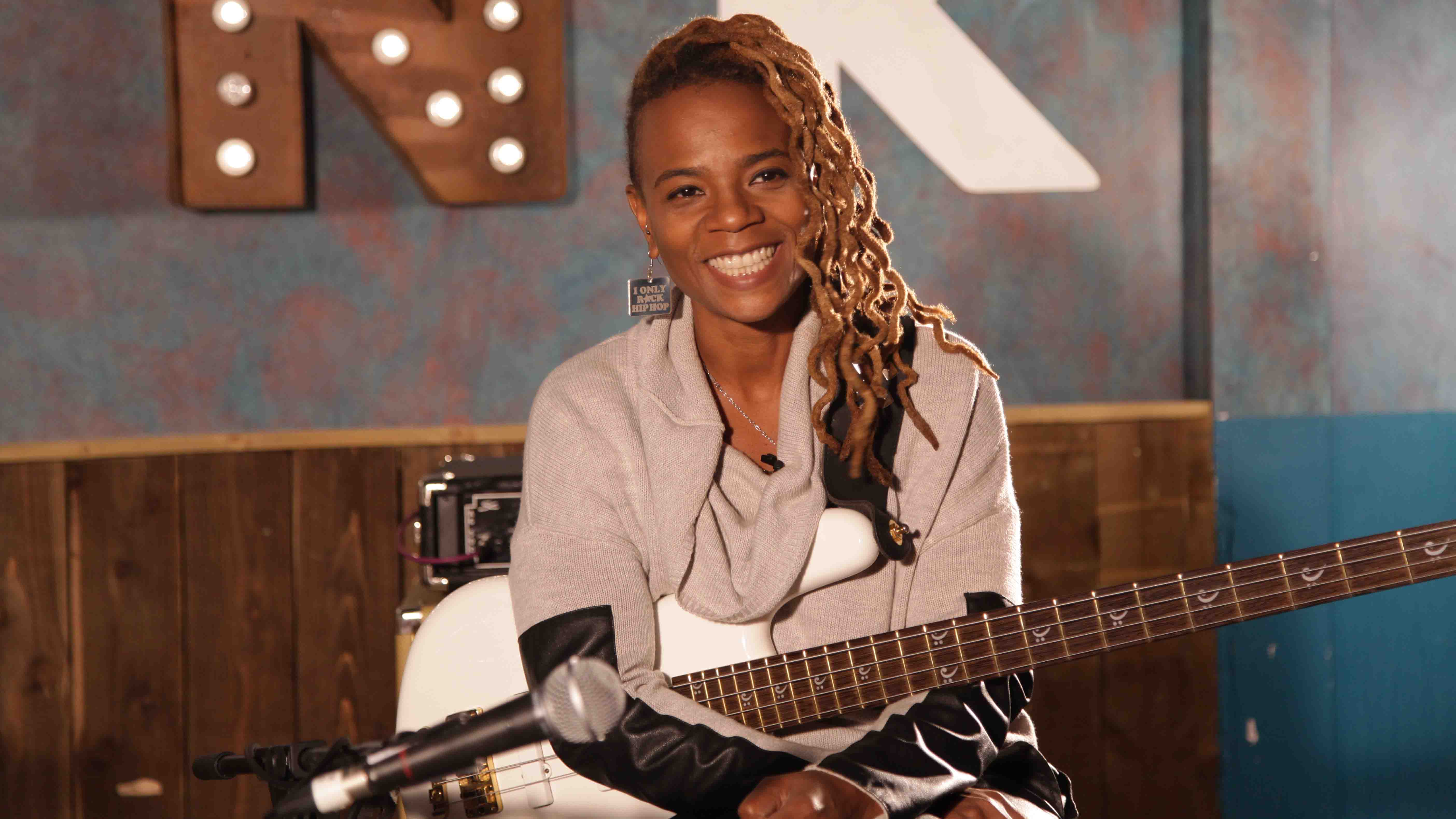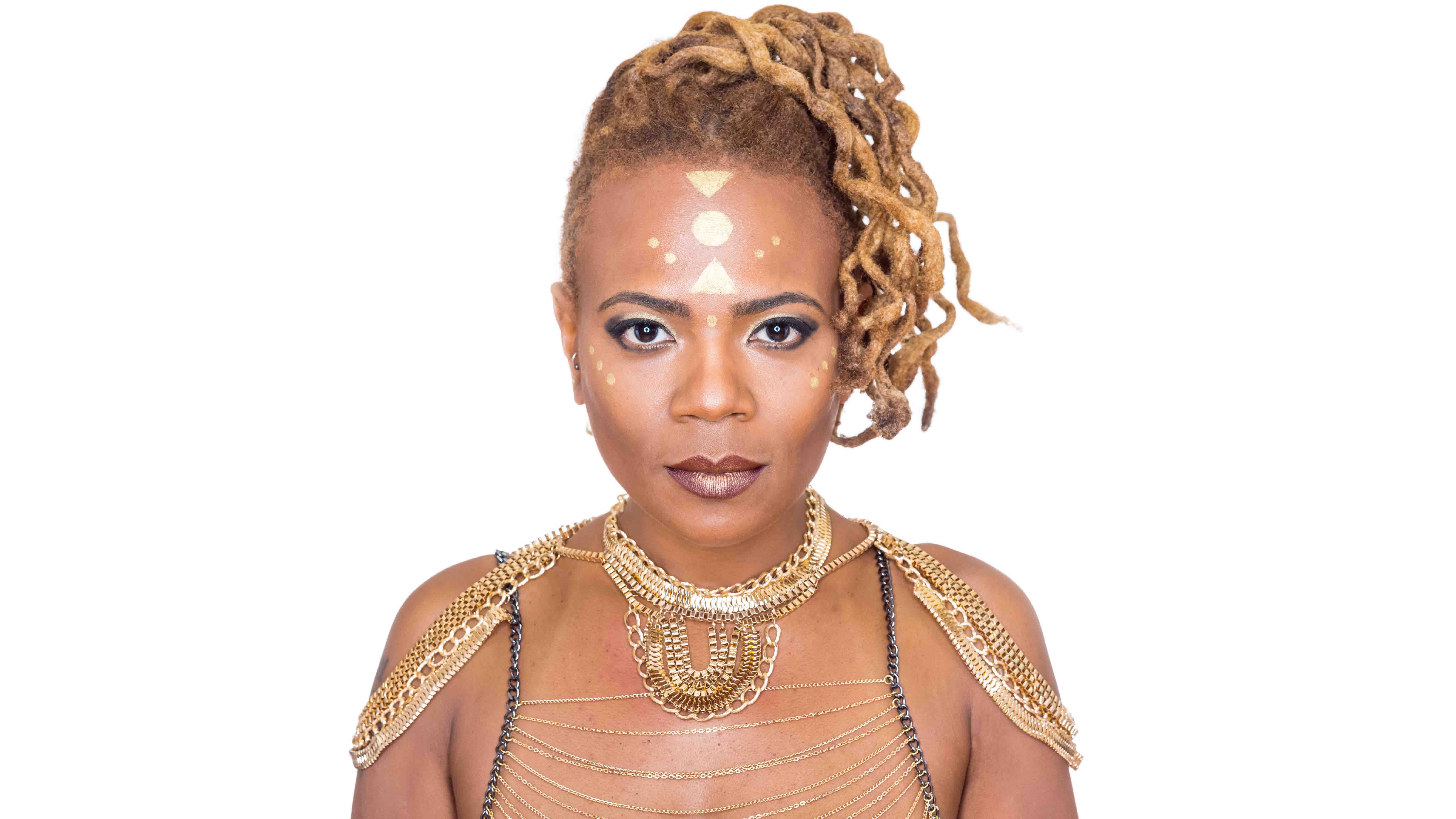Divinity Roxx's top 5 tips for bassists
Ex-Beyoncé bass virtuoso shares advice and experience plus insight into her new solo LP

Introduction
For the past 15 years, Divinity Roxx has been blazing a trail, astounding audiences with her inimitable complex funky basslines and ability to seamlessly rap at the same time.
It was back in 2000 that Roxx attended a bass camp headed up by legendary player Victor Wooten, ultimately impressing him to such an extent that he invited her to join up with his touring band. She continued gigging with Wooten for half a decade, appearing on three of his albums.
Between 2006 and 2011, Divinity achieved worldwide fame trekking the globe with Beyoncé, both playing bass for the R&B superstar and acting as her Musical Director.
In recent years, Roxx has been concentrating on her solo career, and 2016 has seen the release of her third long-player, ImPossible, which fuses funk, hip-hop, reggae, dub, pop, rock and R&B to mesmeric effect.
As someone who dedicated countless hours studying the greats while developing her own incredible technique, feel and style, Divinity Roxx always loves sharing her knowledge and experiences with the next generation. Roxx regularly appears at workshops and masterclasses the world over and we catch up with her shortly after a bass masterclass at Guildford’s Academy of Contemporary Music (ACM).
“I thought [the ACM masterclass] was so much fun!” Roxx enthuses. “There were so many students there and that was really cool to see. Everybody was so eager to see what I had to say about touring and playing. It was a lot of fun and it felt more like a concert than a masterclass.
“We talked about when things go wrong on the road and I told them some pretty funny stories about some things that have happened to me. Some students asked some pretty cool questions about finding their own voice, which I thought was really interesting.
“It’s something that I like to talk about in my masterclasses because I think, as musicians, it’s important for us to study the great ones who come before us, but I also think it’s really important for us as musicians to start finding our own voice and what makes us unique on our instrument.”
Mission: ImPossible
How did Roxx approach the songwriting process on her new solo album ImPossible?
“A lot of the times the music will come first and the bassline will come,” she explains.
“Once I write a bassline and I’m really, really into it, I’ll start pulling up drum sounds and make a little skeleton beat out of it. Then, if I’m really feeling it and I’m getting excited about it, I’ll start laying down scratch vocals, even if it’s just sounds or some kind of hook idea or something.
I have to go in and learn how to play it and rap it at the same time. It’s always an adventure
“The writing process for me is really fun. The funny thing about this album is that we went to the studio and recorded a lot of the music and, while I may have had a verse here or a chorus there or an idea or sentences, I didn’t have full songs. I left New York and went back to LA for a little while and then I came back to New York to finish the album and I needed to just get in and cut all the vocals but I hadn’t finished writing five or six of the songs. I only had three days to finish writing all of the lyrics!”
One aspect of Divinity Roxx’s style that never fails to impress is her talent for lightning-pace rapping while also digging into rigorous basslines. It’s fair to say that it still takes a lot of practise and hard work to nail the combination.
“I’m still developing it and still pushing it and seeing how far I can go with my bass technique and the rapping,” says Divinity.
“It can be difficult because there are some times when I sit and will play bass and rap and write that way but, usually, it’s one or the other and then I have to go in and learn how to play it and rap it at the same time. It’s always an adventure when I’m doing that.
“A good song example would be Can It B SO Hard. I had to really work hard at teaching myself to play that and rap it at the same time. It’s about slowing things down and just doing it again and again. It’s one thing when you’re at home and practising but it’s another thing when you get with the band and you start playing it live. It’s just doing it over and over and over again!”
Across ImPossible, Roxx kept faith with a couple of her custom-built Warwick instruments.
“On this album I played my Warwick Streamers,” she explains.
“I have a five-string Warwick Streamer and a four-string. I just took those two basses in the studio and we basically went direct. It was awesome. I love that [the two basses] were made just for me and they just came out perfect.
The longer I have my Warwick Streamers and the more I play them... it seems as though they’re like fine wine and they just get better with time
“The longer I have them and the more I play them, especially this four-string Streamer, it seems as though they’re like fine wine and they just get better with time. I’ve been having a lot of fun with [the four-string] but I’m kind of beating it up a little bit. I guess that’s just the nature of playing an instrument and taking it on the road.”
So, what’s next for Divinity Roxx?
“I’m doing a bunch of spot dates at the moment so I’m not doing just full-on tours,” she says.
“I’m really, really working hard to share [ImPossible] with the world because I really do think it’s worthy for people to hear it. I think it’s good music and I think it’s unique so I’m just working really hard to get it out there so people talk about it.
“I’ve got some shows coming up in Europe throughout January and I also just started working with this new producer. I don’t know what we’re going to do exactly but we just linked up and I’m going to see if I can get an EP out soon… so there’s still some more songs inside me, I guess!”
Now, it’s time to sit back and learn a few things from Roxx’s top 5 tips for bassists...
For more info on ImPossible, head over to Divinity Roxx, and to find out more about the Academy of Contemporary Music, check out ACM.
Don't Miss
Victor Wooten's top 5 tips for bass players
Stu Hamm's top 5 tips for bassists

1. Keep a strict practice schedule
“One of the things that I like to do and like to encourage some of my students to do is to create a set practice regimen where you’re completely focused on practising. No jamming, no creating, no distractions - just practising bass! And it doesn’t matter what it is that you want to work on, as long as you stick to it being a practise schedule.
“If you say you’re going to practice for an hour, then practice for an hour. For me, a lot of times, if I sit down to practise, I’ll start jamming and I’ll start writing and I have to tell myself, ‘This is not a writing session. This is a practising session so stay focused and practice!’ That’s really important.
“Usually, if I’m sitting down to practise, it starts off with me focused on an exercise whether that be 7th arpeggios forward and backward or doing all the modes in all different keys or something else like that. But then if I hit something cool, I’ll be like, ‘Oh, that sounded cool!’ and I’ll start writing a song and then I have to be like, ‘Nooooo!’ Practise and keep doing this! That’s the biggest thing. If you’re focusing on exercises, then do the exercises.”

2. Work on what you're weak at
“I like to practise what I’m weak at. If there’s a technique that I know that is just not working and it’s been not working onstage and I’ve been trying it, then I know I have to work on it.
“For instance, my ring finger is my weakest finger on my left hand, so I try to focus and practise on strengthening that finger by doing some different exercises.
If your weakness is groove or timing, then I would say practise with a metronome
“Anthony Wellington, an incredible teacher and really good friend of mine, has this exercise called 24 permutations, where you use the numbers 1234. Your index finger is 1, your middle finger is 2, your ring finger is 3 and your pinky is 4 and you play the different permutations of 1234. So, if I was to work on my ring finger, I would start with 3124, then 3142, 3214, 3241, 3412, 3421 and you do that going up and down the neck, crossing over different strings. As long as I’m starting with that third finger - I’m just really trying to strengthen it as much as possible.
“If your weakness is groove or timing, then I would say practise with a metronome. If your weakness is a certain technique - whatever it is - just focus on that thing; make that a part of your practise regimen.”

3. Play with as many different people as you can
“Play with as many different people as you can and try to play as much as you can with people who are better than you. I think that’s really important.
“You know, humility is a really beautiful thing, because if you are humble and you know that there’s this great drummer, put yourself out there and talk to them and ask them questions! If you’re at a bar somewhere and you see somebody playing and you think they’re great, go talk to them, say ‘What’s up?’, buy them a drink and talk about what some of their favourite music is or whatever.
In my experience, musicians are very giving and forthcoming with information
“You’ve just got to get out there and start developing these relationships. It’s networking and developing relationships and, as you develop those relationships, you can say, ‘Hey man, maybe we can jam some time?’ or, ‘Maybe you can show me something?’
“In my experience, musicians are very giving and forthcoming with information. If you seem like you’re eager to learn and you approach another musician with that eager-to-learn attitude, it’s almost like they’re willing to show you and teach you and that’s kind of been the case with me.
“I’ve always been super-curious, so I’ll just walk up to cats and be like, ‘Yo, how did you do that? What was that? Show me that!’ They might laugh at me or think I’m kidding but I’m pretty persistent. Sometimes it works and sometimes it doesn’t, but you just have to find those people who are willing to help you grow.”

4. Practise without the bass
“Something that works for me is to practise with the bass and without the bass. Having that mental practice is important whether it be mentally going up and down the fretboard with exercises, going through different chord progressions or doing stuff that’s related to theory.
“Anthony Wellington has some really great exercises that he’s passed along to me and to all of his students, actually, which help you to practise without the bass guitar. One of the coolest exercises he does is he’ll just randomly come up with numbers 1 through 7, pick any key out of 15 keys and then you have to call out what note corresponds to the number. That’s something that I’ll do when I’m on the plane or when I’m on a train or when I’m just sitting around doing nothing. It’s a good exercise.”

5. Give your brain time to process
“Sometimes, you have to stop and give your brain time to process what you’ve worked on because the brain is continuously working even when you’re not doing. Sometimes I find that if I’m having a hard time playing a lick or if I’m having a hard time working on something and I’ve worked on it for a week or two weeks, I’ll sit the bass down and not even think about it. Then, somehow, miraculously - when I pick the bass back up - I’m able to do what I was having such a hard time with.
“Maybe just give it a few days break. I’ll give it two days break or something because I work on other things, too. I work on making beats and I do a lot of production stuff, which doesn’t have anything to do with the bass, so I might get caught up doing that or writing. Or I might just take a break from music and go for a ride on my bike or go running or exercise or just go out and be social. When I step away for a minute, I find that when I come back and pick up the bass, I’m like, ‘Hey, woah! I’m killing that right now!’
Don't Miss
Victor Wooten's top 5 tips for bass players
Stu Hamm's top 5 tips for bassists